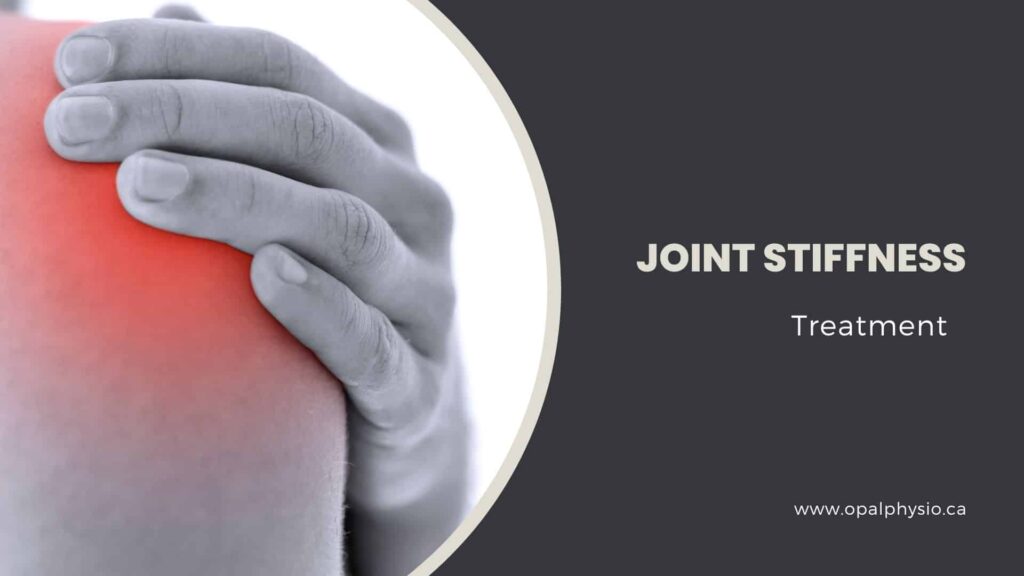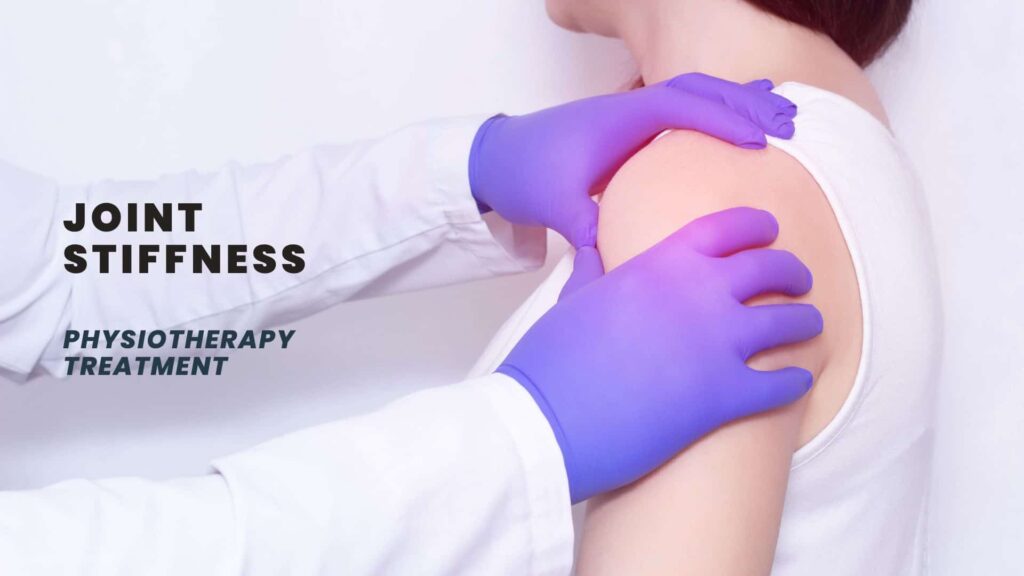Joint Stiffness Physiotherapy Treatment
Joint Stiffness Treatment In Langley
Joint stiffness is characterized by difficulty moving a joint through its full range of motion. It is a common condition that can significantly impact mobility and quality of life. Physiotherapy offers several beneficial treatments to help manage joint stiffness.
If you are struggling with joint stiffness and limited mobility from the effects of an injury or the natural aging process, our experienced physiotherapists are here to help. Our Langley physiotherapy clinic offers comprehensive physical therapy services to reduce joint stiffness and can help you get back to your daily activities and improve your quality of life.

Causes of Joint Stiffness
The most common causes of joint stiffness include:
- Injuries such as sprains, strains, and fractures can damage the muscles, tendons, ligaments, or bones around a joint. This leads to inflammation and swelling that restricts movement.
- Arthritis conditions like osteoarthritis and rheumatoid arthritis cause the breakdown of cartilage and synovial inflammation in joints.
- Repetitive motions from sports, work, or hobbies that strain the joints over time, resulting in tendonitis or bursitis.
- Lack of movement from extended immobility that allows joints to become stiff.
Types of Joint Stiffness
Joint stiffness has many potential causes, and the location, severity, duration, and associated symptoms provide clues to the underlying reason. The main types of joint stiffness include:
Morning Stiffness: Waking up with stiff joints that loosen up after 30 minutes or so is very common. This happens because joint fluid thickens during sleep, making joints stiff initially. It resolves quickly with movement. Morning stiffness by itself is not concerning if it goes away fast.
Age-Related Stiffness: As people age, their cartilage breaks down, and joint fluid decreases, making joints stiffer. Age-related stiffness tends to involve multiple joints and worsens gradually over the years. It’s usually worse in the morning and after inactivity.
Injury-Related Stiffness: Sprains, fractures, and other injuries can cause joint stiffness by damaging structures like ligaments, tendons, and bones. This leads to inflammation, pain, and restricted mobility during healing. Stiffness is localized to the injured joint.
Arthritis: Osteoarthritis and inflammatory types like rheumatoid arthritis cause cartilage breakdown and inflammation in joints over time. This progressive damage leads to chronic, often worsening joint stiffness. It commonly affects the hands, knees, hips, and spine.
Gout: Sudden attacks of severe joint pain, swelling, and stiffness, often in the big toe. It’s triggered by uric acid crystal buildup in joints. Attacks last a few days to weeks and may recur periodically.
Infection
Septic arthritis: It is a bacterial joint infection causing severe pain, swelling, redness, and stiffness. It typically affects large joints like knees, hips, and shoulders and requires urgent medical treatment.
What are the symptoms of joint stiffness?
As the name suggests, the main symptom of joint stiffness is stiffness in the joints. This can make it difficult to move the affected joints and may also cause pain. Stiffness is often worse in the morning and may improve as the day goes on. Other symptoms of joint stiffness can include:
If you are experiencing any of these symptoms, it is essential to see a doctor or physiotherapist so that the cause can be determined and appropriate treatment can be started.

Physiotherapy For Joint Stiffness
Benefits of Physiotherapy
Physiotherapy aims to reduce joint pain and swelling while improving mobility and function. Common physiotherapy treatments include:
- Stretching and range of motion exercises to improve joint flexibility. These help “loosen up” stiff joints.
- Strengthening exercises to support joints and reduce strain on them during movement to help reduce pain.
- Manual therapy techniques, such as mobilizations and massage, directly target joint and muscle stiffness and help break up scar tissue.
- Use modalities like heat, ice, ultrasound, and electrical stimulation to relieve joint pain and swelling to facilitate movement.
- Taping technique to provide extra joint support and stability during activities.
- Education on joint protection principles, proper body mechanics, and activity modification. This prevents further joint strain.
What to Expect During a Joint Stiffness Physiotherapy Appointment
Seeing a physiotherapist can provide significant relief if you are suffering from stiff, painful joints. Here is what you can expect during your first physiotherapy appointment for joint stiffness:
Initial Evaluation
The physiotherapist will start by asking about your medical history and the details of your joint stiffness, including when it started, which joints are affected, and any factors that improve or worsen the stiffness. They will also ask about your pain levels and how the stiffness impacts your daily activities.
Physical Examination
Next, the physiotherapist will conduct a physical exam of the affected joints. They may check your posture, flexibility, range of motion, and strength and look for swelling, tenderness, or deformities. You’ll be asked to move the joints through different motions so they can evaluate limitations.
Diagnosis
Based on the history and exam, the physiotherapist will determine the likely cause of your joint stiffness. Common culprits include osteoarthritis, rheumatoid arthritis, injuries, and repetitive strain. They may order imaging tests like X-rays or MRIs for further diagnosis.
Treatment Plan
Once a diagnosis is made, the physiotherapist will create a tailored treatment plan.
Patient Education
The physiotherapist will provide education on managing your condition through joint protection techniques, proper body mechanics, activity modification, and home exercises. This helps prevent future stiffness and injury.
Follow-Up Plan
They will develop a plan for follow-up appointments to monitor your progress and adjust your treatment plan as needed. Ongoing physiotherapy helps ensure you continue improving joint mobility and function over time.
Seeing a physiotherapist for joint stiffness provides both immediate and long-term relief. With a combination of hands-on treatment and at-home exercises, you can regain movement and live better.
Why choose us for joint stiffness physiotherapy treatment in Langley?
At Opal Physio In Langley, we are dedicated to providing our patients with the highest quality care and treatment. Here are just a few reasons why you should choose us for your joint stiffness physiotherapy treatment:
- Experienced team: Our team of physiotherapists has years of experience working with patients with joint stiffness and related issues. We are dedicated to staying up-to-date with the latest research and techniques to ensure that you receive the best care possible.
- Personalized treatment plans: We understand that every patient is unique, so we develop customized treatment plans tailored to your specific needs and goals.
- Comprehensive care: Our treatment services are comprehensive and designed to address all aspects of your condition, from pain relief to rehabilitation.
- Comfortable environment: Our clinic is designed to be comfortable and welcoming; you can feel relaxed and at ease during your appointments.
- Convenient location: We are conveniently located in Langley City, making it easy for you to access the care you need.
Schedule Your Appointment Today
Joint stiffness can significantly impact mobility, but physiotherapy provides an effective means of managing symptoms. Through exercises, manual therapy, modalities, bracing, and education, physiotherapists create customized treatment plans that help restore joint flexibility and function. Starting physiotherapy under the guidance of a licensed professional can help you move and live better if you have stiff, painful joints.
Don’t let joint stiffness hold you back any longer. Schedule an appointment with our team at Opal Physio today and take the first step towards improved mobility and quality of life. Call us at 604-532-7887 or fill out our online form to request an appointment. We look forward to helping you feel your best!
Frequently Asked Questions
How can I prevent Joint Stiffness?
The good news is that you can do things to prevent joint stiffness. These include:
- Maintaining a healthy weight
- Getting enough sleep
- Taking regular exercise
- Reducing stress
- Avoiding alcohol
- Eating a balanced diet
- Drinking plenty of water
- Using heat and cold therapy to ease pain and swelling
Seeking professional help if symptoms persist beyond three months.
How long does it take to see results from joint stiffness treatment?
The length of time it takes to see results from joint stiffness treatment can vary depending on the severity of your condition and your response to treatment. Some patients may experience immediate relief, while others may require several weeks or months of treatment to achieve their goals.
Does insurance cover joint stiffness treatment?
Many insurance plans cover physiotherapy services for joint stiffness and related issues. We recommend checking with your insurance provider to determine your coverage and any out-of-pocket costs. Our team can also assist with insurance verification and billing.
If you would like to ask us any further questions, please contact us to learn more or to book an appointment.
